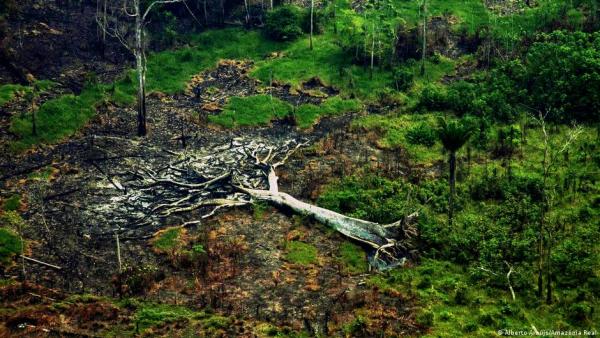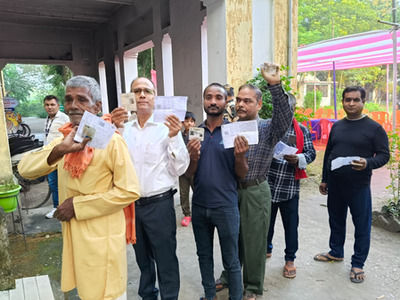

Ahead of the UN climate conference in Brazil, international leaders including Germany's Merz and Brazil's Lula are meeting to discuss climate action. Experts say they should reaffirm ambition to curb emissions.Heads of state are gathering on Thursday and Friday in the Brazilian city of Belem for a Global Leaders Summit ahead of the UN COP30 climate conference. This year's summit is taking place in the heart of the Amazon — a vulnerable region critical to climate stability — as pressure mounts to curb rising emissions and global temperatures driving deadly extreme weather around the world. Germany and the UK are among the fewer than 60 nations likely to send heads of state. European Commission President Ursula von der Leyen will also attend. Leadership more important than ever While the leaders meeting isn't generally expected to produce concrete climate solutions, Johan Rockström, director of the Potsdam Institute for Climate Impact Research in Germany, said it is crucial in setting the direction of COP negotiations. "There wouldn't have been a Paris Agreement without the heads of state leader summit first." He says the presence of leaders such as then German chancellor Angela Merkel and US President Barack Obama was crucial to facilitating the 2015 landmark treaty under which signatories agreed to try and limit temperatures to 1.5 degrees Celsius (2.7 degrees Fahrenheit) above pre-industrial levels. Negotiators will be looking at the leaders' summit to give a "north star" of where to aim in coming negotiations, says Rockström. Geopolitical tensions, multiple wars, economic uncertainty due to US tariffs as well as President Donald Trump's withdrawal from the Paris Agreement and rollback of clean energy policies have all created a challenging environment for this year's talks. The leaders' summit is more important than ever due to geopolitical fragility and market insecurity, said Marc Weissgerber, executive director of E3G in Germany, an independent climate think tank. "Countries, industry, investors and citizens are not so sure where the path is going." An opportunity to change emissions path "The tone that needs to be set is really one of course correcting," said Lien Vandamme, senior campaigner on human rights and climate change at the Center for International Environmental Law. Leaders, especially those from wealthy countries, need to signify a massive increase in ambition and accountability for lowering emissions in line with the Paris Agreement, she said. A week out from the start of COP30, only around a third of countries had submitted their national goals for reducing emissions. The targets that have been presented amount to a 10% cut in emissions by 2035, which is just a sixth of what scientists say is needed. Leaders at the summit need to send a political message that recognizes we are "following a path to disaster," said Rockström. According to the UN, current climate policies could lead the world on a trajectory to more than 3 degrees Celsius (5.4 degrees Fahrenehit) warming by the end of the century, which Rockström says would have an "unmanageable outcome for humanity on Earth." Reaffirm 1.5C Paris Agreement goal Last week UN secretary general António Guterres stated the world will "inevitably" overshoot the 1.5C goal of the Paris Agreement with "devastating" consequences for the world. Scientists consider the threshold as a critical line of defense against climate change's most severe and irreversible damage. Rockström says it is vital that leaders at the summit reaffirm their commitment to the temperature goal. "What I fear — which we cannot allow to happen — is if there are suggestions starting to emerge that we should abandon the 1.5 degrees Celsius limit," Rockström said. He added that just as exceeding a speed limit on the road doesn’t mean restrictions should be abolished, leaders need to use the summit to admit failure while promising they will do everything to minimize overshooting the target agreed in the Paris climate accord. "That will help the negotiations tremendously." Concrete commitments on climate finance Weissgerber stressed the need for more solid commitments on financing adaptation, which is currently "completely underfunded." He wants to see leaders send clear signals of how they plan to scale up the $300 billion by 2035 goal agreed at last year's climate conference in Baku.The target is aimed at supporting developing countries deal with climate disasters and transition to clean energy. He is also hoping to see greater ambition on the so-called 'Baku to Belem Roadmap', which aims to raise $1.3 trillion of public and private funds annually by 2035 — for developing countries to support adaptation plans and low-carbon development. Carsten Elsner, energy researcher at German environmental research organization, the Wuppertal Institute, said Brazil's flagship initiative the Tropical Forest Forever Facility (TFFF) would likely take prominence at the talks. The TFFF is a proposed $125 billion global conservation fund that would pay countries based on how well they protect their forests. He added the fund may be appealing for certain donor countries as it promises a return on investment, unlike other forms of climate finance such as grants. "I think that the countries will just go for it.... it's something that really can align certain countries in a coalition," said Elsner. Strengthening global cooperation Experts say one of the challenges at the leaders' summit will be overcoming deep political divisions and faltering international cooperation. Vandamme said the talks will be an opportunity for leaders to signal that there is still faith in the global system, despite the backdrop of a crisis in multilateralism. She said the global climate regime had to prove it could deliver the solutions needed to tackle the climate crisis. Ahead of the summit, a German environment ministry spokesperson said with the principle of international cooperation under pressure, the event would be an opportunity to show that the vast majority of the global community wants to continue working together to tackle climate change. With the US having dropped out of the Paris Agreement, the leaders' summit will also be one to watch "new alliances" emerging, said Weissgerber. He expects big emitters such as Brazil, the EU, UK and China to take on a bigger leadership role. Vandamme said she will also be looking to see whether leaders at the summit respond to the historic advisory opinion of the International Court of Justice on the legal obligations of states in respect of climate change. The ruling from July this year could see badly affected states seek reparations from big polluters. Edited by: Tamsin Walker
-
Drunk man gropes, tries to kiss Mexican President in public (VIDEO)

-
Drunk man gropes, tries to kiss Mexican President in public (VIDEO)

-
Dinner Tips: Roti or rice, which is better for dinner? Clear your confusion now...
-
Assembly polls: Bihar records 13.13 per cent voter turnout in first two hours

-
"OPD is flooded with patients..." Doctors in Delhi sound alarm bells over rising pollution
